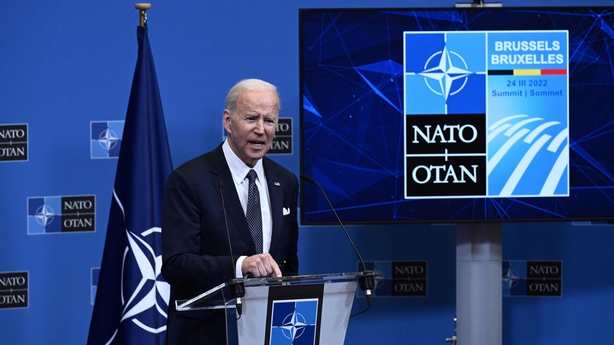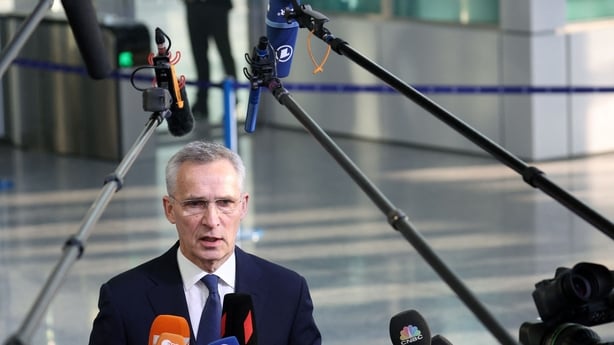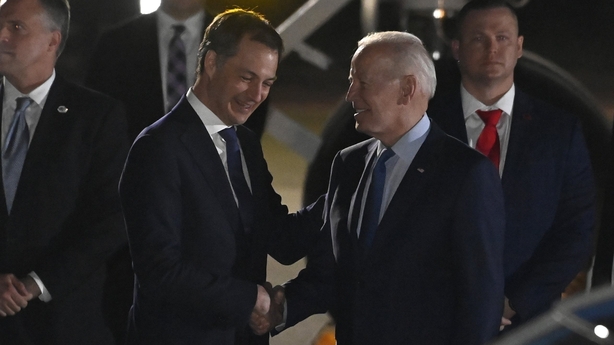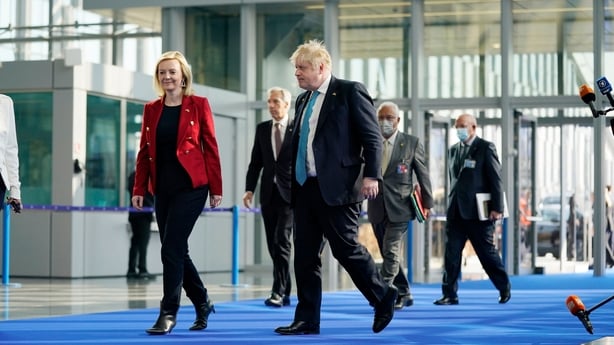Western leaders piled on military and humanitarian aid for Ukraine today with US President Joe Biden calling Russian leader Vladimir Putin a "brute" and Britain denouncing Moscow's invasion of its neighbour as "barbarism".
At an unprecedented triple summit in Brussels, transatlantic alliance NATO, G7 rich nations and European leaders addressed the continent's worst conflict since the 1990s Balkans wars.
NATO announced new battle groups for four nations in east Europe, while Washington and London increased aid and expanded sanctions to new targets, including a woman London said was the stepdaughter of Russia's foreign minister.
"This single most important thing is for us to stay unified and the world continue to focus on what a brute this guy is and all the innocent people's lives that are being lost and ruined," Mr Biden told reporters in Brussels.
"Vladimir Putin has already crossed the red line into barbarism," added British Prime Minister Boris Johnson, saying the tougher the sanctions the sooner war would end.
The European Union was set to unveil steps to wean itself off Russian energy, something likely to drive up fuel costs even further around the continent. Moscow supplies 40% of the EU's collective gas needs and more than a quarter of its oil imports.
Still, the measures stopped short of President Volodymyr Zelensky's calls for a full boycott of Russian energy and a no-fly zone over Ukraine where Moscow's bombs are wreaking havoc.
Responding to today's show of unity in Brussels, Moscow said the West had itself to blame for the war by arming the "Kyiv regime".
The invasion unleashed on 24 February by Russian leader Vladimir Putin has killed thousands of people, sent 3.6 million abroad, smashed cities, and driven more than half of Ukraine's children from their homes according to the United Nations.
In a month of fighting, Ukraine has fended off what many analysts had anticipated would be a quick Russian victory.
So far, Moscow has failed to capture any major city. Its armoured columns have barely moved in weeks, stalled at the gates of the capital Kyiv and besieging cities in the east.
They have taken heavy casualties and are low on supplies.Ukrainian officials say they are now shifting onto the offensive and have pushed back Russian forces, including north of Kyiv.
Ukraine said its forces had destroyed the Russian landing ship the "Orsk" at the Russian-occupied port of Berdyansk.
Video footage, which Reuters confirmed was from Berdyansk, showed smoke rising from a blaze at a dock and the flash of an explosion. Russian officials did not immediately respond to requests for comment.
The Kremlin accuses NATO of an "hysterical and inadequate" understanding of events in Ukraine, a former Soviet Republic linked since the 9th century when Kyiv became the capital of the ancient state of Rus.
Mr Putin says NATO's eastern expansion threatened Russia's security and divided it from Ukraine.

As Mr Biden rallied allies on his first trip abroad since the war began, Washington announced $1 billion more humanitarian aid for Ukraine and an offer to take in 100,000 refugees.
Mr Biden said Russia should be expelled from the G20 group of major economies.
President Biden also said if countries, such as Indonesia and others do not agree with removing Russia, then in his view, Ukraine should be allowed to attend the meetings.
He added that Vladimir Putin had failed to divide the West with his war on Ukraine.
"NATO has never, never been more united than it is today. Putin is getting exactly the opposite of what he intended to have as a consequence of going into Ukraine," Mr Biden said after a meeting with NATO leaders.
We need your consent to load this rte-player contentWe use rte-player to manage extra content that can set cookies on your device and collect data about your activity. Please review their details and accept them to load the content.Manage Preferences
He added that NATO would "respond" if Putin used a chemical weapon in his war on Ukraine.
"We will respond if he uses it. The nature of the response would depend on the nature of the use," Mr Biden added.
Ukrainian President Volodymyr Zelensky called on NATO, EU and G7 countries meeting in Brussels to help Kyiv fight Russia's invasion, which has killed thousands and driven a quarter of Ukraine's 44 million people from their homes.
"We are determined to continue to impose costs on Russia to bring about the end of this brutal war," NATO Secretary General Jens Stoltenberg told the leaders gathered at the Western military alliance's headquarters.
"We will discuss allied support to Ukraine. We will also address NATO's efforts to strengthen our defences now and for the years to come."
Mr Biden told the closed-door session he was in favour of sending more troops to NATO's eastern flank, said a senior US administration official, adding Washington was working to support Ukraine with anti-ship missiles.

NATO has, however, rejected repeated pleas by Kyiv to defend Ukraine's skies from Russian air strikes, and Mr Zelensky - who joined the NATO summit through a video call - has complained the West had not provided tanks or modern anti-missile systems.
Read more:
Latest Ukraine stories
Turning point in history: One month of war
NATO would also not send troops or planes to Ukraine, reiterated Mr Stoltenberg as two media outlets in his native Norway reported he would stay on as the alliance's head beyond the end of his current term later in 2022 due to the war.
"NATO has yet to show what the alliance can do to save people," Mr Zelensky told the summit, adding he believed Mr Putin wanted to attack eastern NATO members - Poland and the Baltic states - as well.
We need your consent to load this rte-player contentWe use rte-player to manage extra content that can set cookies on your device and collect data about your activity. Please review their details and accept them to load the content.Manage Preferences
"It feels like we're in the grey zone between the West and Russia, but we're protecting all our and your shared values."
"The alliance can still prevent the deaths of Ukrainians from Russian strikes, from Russian occupation by giving us all the weapons we need."

Mr Putin says his "special military operation" is meant to disarm Ukraine, whose aspirations to join NATO and the EU are anathema to Moscow.
Sanctions and energy
A NATO official estimated that up to 15,000 Russian troops have been killed in Ukraine so far and that a total of up to 40,000 have been killed, wounded, taken prisoner or are missing.
The month-long land, sea and air assault targeted residential areas, schools and hospitals in Ukrainian cities including Kharkiv as well as besieging Mariupol on the Sea of Azov.
Russia denies targeting civilians.
Britain today sanctioned another wave of Russia's banks including Gazprombank and Alfa Bank, as well as a woman London said was the stepdaughter of Sergei Lavrov, Mr Putin's veteran foreign minister.
"Putin has already crossed the red line into barbarism," Boris Johnson said, adding: "The harder our sanctions ... the more we can do to help Ukraine ... the faster this thing can be over."

Mr Johnson told LBC radio earlier that one option was to see if more can be done to prevent the Russian president from accessing his gold reserves, which could stop people buying Russian gold to convert it into hard currency.
The resolve to punish Moscow with massive sanctions will be underlined by an emergency meeting of the G7 advanced economies, which will bring Japan into the room with six NATO members.
Then, with a summit of the 27-nation European Union, countries representing more than half of the world's gross domestic product will have met in one day.
"Paralyse Putin's war machine. Oil and gas are at its heart," said Estonia's Prime Minister Kaja Kallas.
"We should set up a special third-party account to prevent revenues from going towards financing the war."
The EU - which says it has already taken in some 3.6 million refugees from Ukraine - is only very slowly moving away from Russian gas and still depends on Moscow for a large share of its energy needs.
Energy has largely been omitted from sanctions, the biggest loophole in measures that have otherwise frozen Russia out of world commerce to a degree never attempted before on such a large economy.
EU leaders are expected to agree at their two-day summit to jointly buy gas, and Brussels also hopes for a deal with Mr Biden to secure additional US liquefied natural gas supplies for the next two winters.

